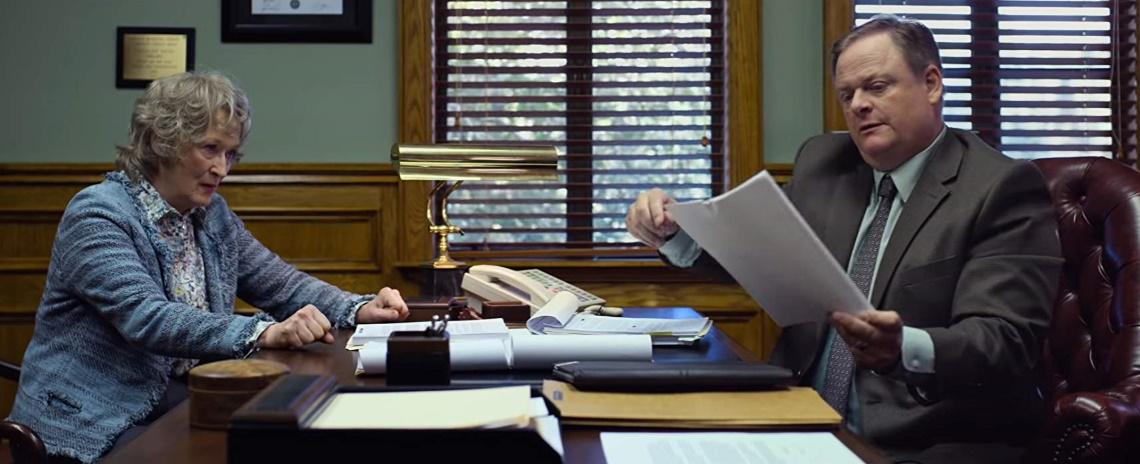Something should have been done a long time ago. This is the non-specific rallying cry that an increasing number of films are now adopting, some two decades into the 21st century. It’s the type of generic sentiment that’s easy to grasp regardless of where you fall on the political spectrum. “Someone should do something” is the thematic bullseye for films that aim to be at once socially conscious and blandly inoffensive. It’s the reason why Aldous Snow’s ballad from Forgetting Sarah Marshall (2008) remains preposterously relevant a decade later: “Sometimes I sit in my room and I don’t know what to do, but we’ve gotta do something!” It wouldn’t be far-fetched to hear a line like this from a public figure who wants to convey at least the appearance of concern about the world's problems. The Laundromat — Steven Soderbergh’s second Netflix Original of the year (and his fifth directorial effort since coming out of a short-lived retirement in 2017) — is proud to brandish such generic hand-wringing as it takes a swing at the true story of the Panama Papers. Those would be the 11.5 million documents from law firm Mossack Fonseca & Co. that were leaked in 2015, a treasure trove containing financial and attorney-client information from nearly a quarter of a million offshore entities.
Strangely enough, the men behind the firm’s name — Ramón Fonseca (Antonio Banderas) and Jürgen Fonseca (Gary Oldman) — serve as the viewer's guides through the tremendously dense legalese and financial jargon of the Panama Papers. Portrayed cheekily (or condescendingly, depending on one feels about it) by Banderas and Oldman, the two financiers follow the same playbook that Adam McKay used in The Big Short (2015) and Vice (2018), addressing the audience in a series of fourth-wall-breaking monologues. They attempt to convey the complexity of the Panama Papers while simultaneously diverting some of the blame from themselves to their clients and the U.S. government. This is before The Laundromat transitions to its real concern: those affected most by the greed of Mossack Fonseca and countless firms like it.
Five vignettes — each named after a different “financial secret” from Mossack Fonseca — profile the different ways in which the billion-dollar shenanigans detailed in the Panama Papers destroyed real people’s lives. Ellen Martin (Meryl Streep) winds up following an illicit financial trail after a freak accident leaves her husband (and 20 others) dead and without adequate compensation. Matthew Quirk (David Schwimmer) discovers that the cheaper insurance option for his pleasure-cruise company also turned out to be the fraudulent option. Irvin Boncamper (Jeffery Wright) is the man at the top of the reinsurance agency who must evade the IRS and any disgruntled policyholders who might be headed his way. The Laundromat also crams in a couple of fringe “fairy tales,” as Mossack and Fonseca call them, stories that have only glancing relevance to the main narrative threads.
Soderbergh’s latest is most searing when it’s emulating his past works. Streep’s story plays out like that of a "Grandma Brockovich," subbing Julia Roberts and her unwavering follow-the-money attitude in Erin Brockovich (2000) for an older woman who just wants to know why she won’t be receiving what she’s owed. Schwimmer’s accidental financial failures and hapless demeanor recall Matt Damon in The Informant! (2009). Even the film’s structure — a set of interconnected pieces focused on how a key issue facing the world today has affected the livelihood of Americans on all levels in the chain-of-command — is reminiscent of Traffic (2000), Soderbergh’s admirably misguided attempt to tackle the War on Drugs. These primary plot threads are The Laundromat’s strongest elements, even if they do touch on territory that Soderbergh has previously explored. However, when looking at the director’s filmography, there’s a glaring omission from The Laundromat that could’ve helped fortify the film’s peripheral stories: the slick energy of his caper films, the Ocean’s trilogy and Logan Lucky (2017).
The organized chaos of Soderbergh’s heist films is begging for a place in The Laundromat, but it never gets an opportunity to emerge. Anything not directly related to the Streep-Schwimmer-Wright thread is tedious in comparison. Given the already-slim 95-minute running time, the film's two tangents — one about an entrepreneur (Nonso Anozie) who uses his offshore assets to bribe his loved ones, the other about a businessman (Matthias Schoenaerts) attempting to pull off a fraudulent deal in China — feel like an unnecessary detour from the more substantial material. If Soderbergh and screenwriter Scott Z. Burns (who has collaborated with the director on three previous works, including The Informant!) had flexed those Ocean’s muscles and replaced these digressions with more riveting (and relevant) material, The Laundromat would have been much improved. With nearly 12 million documents from Mossack Fonseca alone, a lack of raw material to draw from isn't the problem.
The Laundromat’s biggest flaw is intrinsic to the film’s structure: Mossack and Fonseca themselves. No one likes being addressed by someone (or two someones) who acts as if they’re more intelligent — even when the topic under consideration is convoluted and practically impenetrable without some sort of guidance. Banderas and Oldman -- the latter dancing precariously on the line between German accent and Goldmember impression -- are admittedly being satirical when their characters shrug off their culpability, but it’s the same oh-so-clever schtick that has gotten Adam McKay into critical hot water twice now. It’s one thing to say that “someone should do something,” but it’s something completely different to cynically assert that you there, watching this film while relaxing on the couch or riding the subway or sitting in a coffee shop, should do everything within your power to make sure this doesn’t happen again. If there’s one thing The Laundromat’s five vignettes teach us, it’s that We the People don’t have that kind of power — large-scale financial corruption has long been the purview of the global elite.
Rating: C+


